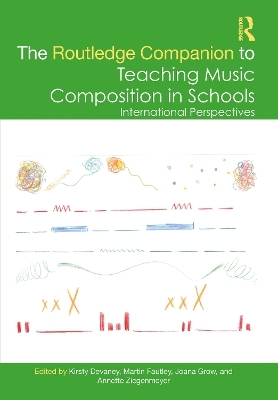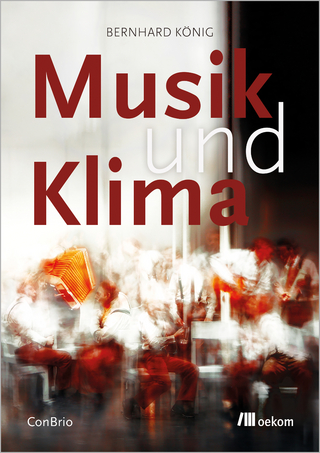
The Routledge Companion to Teaching Music Composition in Schools
Routledge (Verlag)
978-1-032-02626-8 (ISBN)
With contributors from over 30 countries, this volume encompasses theoretical, historical, empirical, and practical approaches and enables comparisons across different countries and regions. Chapters by experienced educators, composers, and researchers describe in depth the practices taking place in different international locations. Interspersed with these chapters, interludes by the volume editors contextualize and problematize the teaching and learning of composing music. The volume covers a range of contexts, including formal and informal, those where a national curriculum is mandated or where composing is a matter of choice, and a range of types, styles, and genres of musical learning and music-making.
Providing a wide-ranging and detailed review of international approaches to incorporating music composition in teaching and learning, this volume will be a useful resource for teachers, music education researchers, graduate and undergraduate students, and all those working with children and young people in composing music.
Kirsty Devaney is a composer and music education researcher based in Birmingham, UK. As a composition tutor at Royal Birmingham Conservatoire, and founder of the Young Composers Project, Kirsty specialises in composing music with, and for, non-professional and youth groups. Her music has been aired on BBC Radio 3 and shortlisted for a British Composer Award. Martin Fautley is a Professor of Education at Birmingham City University, UK. He researches and writes about various aspects of teaching and learning in music, specializing in creativity and assessment. He is the author of 10 books, as well as over 60 journal articles, book chapters, and academic research papers. Joana Grow is a Professor of Music Education at Hanover University of Music, Drama and Media, Germany. Her areas of teaching and research are music composition, gender and music education, professionalization of student teachers, language-sensitive music education, and teaching music history. Annette Ziegenmeyer is a Professor of Music Education at the University of Luebeck, Germany. Her areas of teaching and research cover a broad range of topics such as music composition in schools and beyond, community music/music in social work, and music education in prisons.
Introduction 1. Battle Dances and 808s: Teaching Music Creation in Australia 2. From Composing Project to University Course: Formal and Informal Pathways of Learning to Compose in Music Classrooms in Austria 3. Expanding Analytical Eyes and Ears on Compositional Processes: Alternative Musical Pedagogies on Brazilian Education Interlude I: What is Composing? 4. Teaching Composing in Canadian Music Classrooms 5. Assessing Composition/Improvisation in School Music Education in the Global Age of China 6. The Challenges, Models and Outcomes of Composing in Croatian Compulsory Schools Interlude II: Creativity and Composing in Education 7. Composing in the Classroom: The Case of Czech Republic 8. Mapping the Field of Composing Pedagogy in Finland: From Musical Inventions to Cultural Participation 9. As For Us in France – Why Do We Call It Creation? Interlude III: Starting Points of Composing? 10. Composition in Germany in its Fledgling Stages Between Extracurricular Projects and School Music Classes 11. Attending to Creative Music Making and Composing in Greek School Music Curricula: Preliminary Findings from a Document Analysis 12. Composition and Creativity in Music Education in Iceland Interlude IV: Ways to Teach Composing 13. Composition Pedagogy in Italian Schools: A Model for Teaching Music Composition Through Processes 14. A Sheet of Paper Considered as an Instrument: Examining the Separation of Form and Content in Creative Music Education 15. Did You Write That Song? Learning Composition in the Kenyan Secondary School Interlude V: Considering Gender, Equality, Diversity and Inclusion in Teaching Composing 16. Policies and Practices in Teaching Music Composition in Mexican Schools 17. Music Composition as Playful Activity Perspectives on Teaching Composing from the Netherlands 18. Home-grown Progressivism: Composing in Aotearoa New Zealand Primary and Secondary Schools Interlude VI: Hegemony and Axiology in Composing Pedagogies 19. Teaching Music Composition in Nigerian Classrooms: Current Practice, Training and Creative Developments (With Particular Reference to Institutions in Southern Nigeria) 20. Composition in the Classroom in Norwegian Elementary School 21. Creativity in the Polish Music Classroom: Historical Perspectives and Recent Actions Interlude VII: The Role of Digital Technology in Classroom Composing 22. Making a Difference in the Music Classroom: The Role of Music Composition in Reframing Pupils’ Attitudes Towards Music Education in a Portuguese Classroom Context 23. Creativity and Composition in South African School Curricula 24. Music Composition in Spanish Schools Interlude VIII: Why Compose in Music Education? Arguments Between Curricular and Extracurricular Settings 25. Composition and Creative Music Making in Swedish Public Schools and Other Educational Settings 26. Composing in Schools: A Perspective on the Multilingual Context of Switzerland 27. The Teaching of Music Composition in Trinidad and Tobago Interlude IX: Notation – its Place and Role in Composing Pedagogies 28. Composition-Oriented Creative Activities in Music Lessons of Turkish General Schools 29. Teaching and Assessing Composing in English Secondary Schools: An Investigation into Music Teacher Confidence 30. Assessment of Composing in the Lower Secondary School in England Interlude X: The Place of Assessment in Teaching and Learning Composing 31. The Place and Value of Composition in the Music Curriculum in Scotland 32. Pedagogical Models of Teaching and Learning Music Composition in Higher Education: Practices and Perspectives from Uganda 33. When Creative Stars Align: Music Composition in K-12 Schools in the US 34. Situating Composition in Music Education in the United States Conclusion
| Erscheinungsdatum | 22.08.2023 |
|---|---|
| Reihe/Serie | Routledge Music Companions |
| Zusatzinfo | 13 Tables, black and white; 17 Line drawings, black and white; 17 Illustrations, black and white |
| Verlagsort | London |
| Sprache | englisch |
| Maße | 178 x 254 mm |
| Gewicht | 1147 g |
| Themenwelt | Kunst / Musik / Theater ► Musik ► Musiktheorie / Musiklehre |
| Schulbuch / Wörterbuch | |
| Sozialwissenschaften ► Pädagogik | |
| ISBN-10 | 1-032-02626-X / 103202626X |
| ISBN-13 | 978-1-032-02626-8 / 9781032026268 |
| Zustand | Neuware |
| Informationen gemäß Produktsicherheitsverordnung (GPSR) | |
| Haben Sie eine Frage zum Produkt? |
aus dem Bereich


